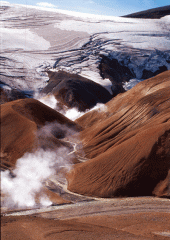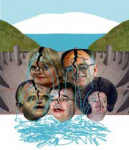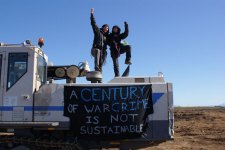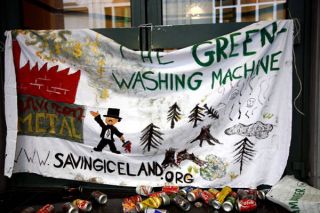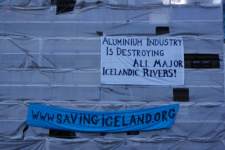'Saving Iceland'
Tag Archive
Feb 09 2009
ALCOA, Bakki, Bechtel, Century Aluminum, Climate Change, Dams, Ecology, Economic Collapse, Energy Prices, Geothermal Energy, Greenwash, Hengill, hydropower, IMF, Kárahnjúkar, Landsvirkjun, Miriam Rose, Reykjavik Energy, Rio Tinto Alcan, Saving Iceland, Þjórsárver
From New Renaissance Magazine
By Miriam Rose
The economic issues currently causing mass demonstrations in Iceland have a less publicised ecological cousin, and one which the IMF has recently identified as part of the economic collapse. In 1995 the Ministry of Industry and Landsvirkjun, the national power company, began to advertise Iceland’s huge hydropower and geothermal energy potential. In a brochure titled “Lowest energy prices!!” they offered the cheapest, most hard working and healthiest labour force in the world, the cleanest air and purest water – as well as the cheapest energy and “a minimum of environmental red tape” to some of the world’s most well known polluting industries and corporations (such as Rio Tinto and Alcoa). This campaigning has led to the development of an ‘Energy Master Plan’ aimed at damming almost all of the major glacial rivers in Iceland, and exploiting all of the geothermal energy, for the power intensive aluminium industry. The loans taken by the Icelandic state to build large scale energy projects, and the minimal payback they have received from the industry, has been a considerable contributing factor to the economic crisis, while at the same time creating a European ecological crisis that is little heard of.
The Largest Wilderness in Europe
I first visited Iceland in 2006 and spent a week with activists from the environmental campaign Saving Iceland, a network of individuals from around Europe and Iceland who decry the fragmentation of Europe’s largest wilderness in favour of heavy industry. From these informed and passionate folk I learned of the 690 MW Kárahnjúkar dam complex being built in the untouched Eastern Central Highlands to power one Alcoa aluminium smelter in a small fishing village called Reydarfjörður. The dams formed the largest hydro-power complex in Europe, and were set to drown 57 km2 of beautiful and virtually unstudied wilderness, the most fertile area in the surrounding highlands. Ultimately it would affect 3% of Iceland’s landmass with soil erosion and river silt deprivation. They also explained how materials in the glacial silt transported to the oceans bonds with atmospheric CO2, sinking carbon. The damming of Iceland’s glacial rivers not only decreases food supply for fish stocks in the North Atlantic, but also negatively impacts oceanic carbon absorption, a significant climatic effect. After taking part in demonstrations at the construction site of the Alcoa smelter (being built by famous Iraq war profiteers Bechtel), I went to see the area for myself. Read More
Oct 26 2008
3 Comments
ALCOA, Century Aluminum, Economic Collapse, Economics, Energy Prices, Jaap Krater, Kárahnjúkar, Landsvirkjun, Norsk Hydro, Rio Tinto Alcan, Saving Iceland
Jaap Krater, Morgunblaðið, 26-10-2008
In times of economic crisis, it is tempting to embrace new megaprojects such as new power plants and aluminium smelters. But will this realistically improve Iceland’s economic prospects?
Prime minister Geir Haarde recently explained on Stöd 2’s chat show Mannamál that one of the main reasons for the fall of the Krona, was due to the execution of heavy industry projects: the construction of Kárahnjúkar and Alcoa’s smelter in Reyðarfjörður. If more large projects are executed, what will the cost be for the Icelandic taxpayer?
Haarde’s comments were not surprising. Before construction of Kárahnjúkar many economists predicted the negative impact on inflation, foreign debt and the exchange rate of the ISK.
Of course there is some economic benefit from new smelters, but “it is probably outweighed by the developments’ indirect impact on demand, inflation, interest rates and the ISK exchange rate,” stated a report by Glitnir in 2006 on the impact of aluminium expansion in Iceland. The report expected an increase in inflation and a depreciation of the ISK.
“Kárahnjúkar will never make a profit, and the Icelandic taxpayer may well end up subsidising Alcoa,” said the eminent economist Thorsteinn Siglaugsson after publishing another report on the profitability of the Alcoa dam in East Iceland before construction commenced. Read More
Oct 26 2008
Saving Iceland
The Saving Iceland gathering will take place during the weekend of November, 7th – 9th, in Ghent in Belgium. Every activist who was involved in the Saving Iceland Campaign in the past, and everybody who wants to join the campaign in the future is welcome. For practical reasons we need to know how many people will come. So subscription is necessary. Let us know by sending an email to savingicelandinfo@gmail.com. Ask by mail for more information about the exact location and the timetable.
Oct 23 2008
Century Aluminum, Economic Collapse, Economics, Jaap Krater, Saving Iceland
Century Aluminum announced in a statement it is reconsidering the planned smelter in Helguvík. It said it has stopped making any new capital commitments due to the global financial crisis.
“In the current environment, we have ceased making any new capital commitments and are reducing project spending. We believe the potential exists for a prudent way forward over time, but will soberly evaluate the feasibility of all elements of the project during the near term,” (1) said Logan Kruger, Century’s CEO.
While Century Aluminum’s revenue for the third quarter of 2008 rose due to an increase in aluminium shipments (2), prospects were deemed less rosy. Merrill Lynch downgraded Century Aluminum’s investment rating to ‘underperform’. It said aluminium pricing is weak, inventories of the metal are high and there are little catalysts to drive the price up.
“Some might think this is bad news for Iceland and that a new smelter could help with the economic crisis. But when we looked at what happened with Alcoa Fjardaal and Karahnjukar, a cancellation of Helguvik may be a blessing in disguise,” says Saving Iceland’s Jaap Krater. Read More
Sep 30 2008
Actions, Climate Change, Saving Iceland
 Economist.com – When thinking globally requires unpleasant action locally.
Economist.com – When thinking globally requires unpleasant action locally.
LAST Thursday, at a conference on aluminium smelting in Germany, environmental activists tripped the fire alarms. Later, they set off a deafening rape alarm in the main auditorium, and suspended it out of reach of the indignant organisers using helium balloons. They also chucked in a few stink bombs, and scattered leaflets among the bewildered crowd.
Protesters from the same group have chained themselves to machinery, suspended banners from building façades and blockaded construction sites, to name just a few of the activities that have got them arrested, all in the name of “Saving Iceland”, as their organisation is called. Their grievance is simple: they do not think that power companies should be building dams and drilling wells for geothermal plants in pristine parts of Iceland, simply to provide power for aluminium smelters. Read More
Sep 29 2008
Andri Snaer Magnason, Arms Industry, Bauxite, Geothermal Energy, Greenwash, India, Media bias, Or, Pollution, Rio Tinto Alcan, Saving Iceland, Vedanta
By Snorri Páll Jónsson Úlfhildarson, orignally published in Morgunblaðið
“Do you know that your wheelchair is made out of aluminium?” said a police officer to one of those who stopped work in Helguvík this summer. Thereby he swamped all the arguments of the opposition to aluminium for good, didn’t he? Shortly after the publication of Jakob Björnsson’s (former director of energy affairs) article about the singer Björk Guðmundsdóttir and her usage of aluminium, the editors of Morgunblaðið got ready and wrote an editorial where it says that the opposers of aluminium are probably not self-consistent most of the time. Most of them use aluminium everyday and even Saving Iceland cooks in aluminium pots and uses aluminium polse to hold up their tents. “Hypocrisy” said Morgunblaðið.
This critique is far from being new. It has systematically been used against those who object to the further build-up of heavy industry here in Iceland, the destruction of Iceland’s nature for energy production, the destruction of ecosystems worldwide because of bauxite mining, and energy realization to a company that prides itself of its collaboration with the U.S. millitary. In addition to when aluminium opposers are all said to be wanting to move the Icelandic society back to the turf huts and build the country’s economy on picking mountain grass, this has been the main criticism.
No matter how many times it has been pointed out that at least 30% of all produced aluminium is used for the arms industry; no matter how many times it has been pointed out how much aluminium ends as a land-filling after having functions as single use drinking facilities; no matter that the context between low energy prices and the fact how easy it is for us to produce aluminium, use it once, throw it away and produce more – still we are being told that we are not self-consistent.
Read More
Sep 25 2008
Actions, ALCOA, Arms Industry, Greenwash, Rio Tinto Alcan, Saving Iceland
Today, the
11th International Conference on Aluminium Aloys (ICAA) met with angry protests. Activists from the environmentalist network Saving Iceland disrupted the proceedings at the University in Aachen. Early this morning, during one of Rio Tinto Alcan’s lectures, the fire alarms in the building were put on. Later today – again during Rio Tinto Alcan’s lecture – stink bombs were thrown and a high volume rape alarm was put on and suspended out of reach by green and black helium baloons. The auditorium was also strewn with information leaflets. The aim was to call attention to the industry’s singular involvement in ecological destruction in Iceland, as well as on a global scale.
The ICAA conference is a weeklong event held at a different international location every 2 years. This is its first appearance in Germany and as such is run in parallel to the Aluminium trade fair in Essen, about 80 km away. This double event is sure to call together all major players of an industry that still tries to present itself as having a green conscience, and with some success: Alcoa has been included in the Dow Jones Sustainability Index, for the 7th year running. [1] Environmentalists dispute this depiction in the strongest terms.
Read More
Sep 18 2008
1 Comment
Actions, ALCOA, Bakki, Century Aluminum, Dams, Denmark, Geothermal Energy, Greenwash, Jaap Krater, Rio Tinto Alcan, Saving Iceland
Today we received a letter from Denmark:
This morning, big banners were hanged on a building in Copenhagen saying: ,,Aluminium Industry is destroying all major Icelandic rivers!” A big advertisment from Icelandair Airline Company, showing Icelandic rivers, was hanging on this same wall last week.
The construction of the planned new Century aluminium smelter in Helguvík and Alcoa’s smelter in Húsavík, will lead to damming of more glacial rivers and geothermal areas. Today it looks like dams will be built in Þjórsá River, Tungnaá, Skjálfandafljót and Jökulsá á Fjöllum; only for further heavy industry projects.
Read More
Sep 17 2008
Actions, Saving Iceland
Islandia tiene una reputación de energia limpia y es el ejemplo clásico de la limpia energía geotérmica. Pero recientemente, las corporaciones de aluminio ALCOA, RioTinto-Alcan y Century Aluminum están presionando para un desarrollo geotérmico intensivo y a gran escala para impulsar nuevas fundidoras en la isla, destruyendo grandes tramos de naturaleza intacta. Y esto no es suficiente. Si todos los planes de industria pesada son llevados a cabo, todos los rios glaciales importantes se verán afectados.
La organzación Saving Iceland está llevando a cabo su cuarto campamento de acción directa en medio de la naturaleza islandesa. Read More
Sep 17 2008
Actions, Saving Iceland
A Islândia tem a boa reputação de utilizar energia limpa, sendo muitas vezes o exemplo de matriz energética ecológica. Contudo, recentemente as indústrias de alumínio ALCOA, RioTinto-Alcan e Century Aluminium estão desenvolvendo em larga escala a energia geotérmica para suprir o processo de fundição do alumínio chamado de “smelter”, destruindo grandes extensões de natureza intocada da ilha do subártico. E não pára por aí: se todos os planos da indústria pesada forem executados, os rios glaciais mais importantes também serão represados..
“Saving Iceland” está organizando seu quarto acampamento de ação direta nos campos islandeses. Read More
